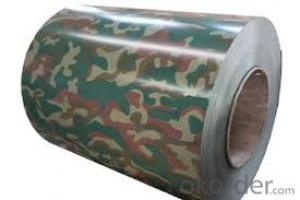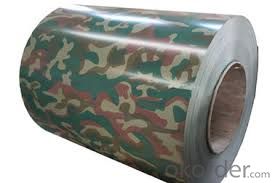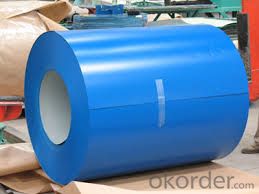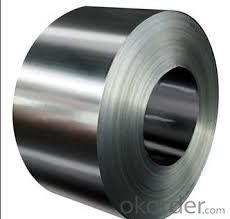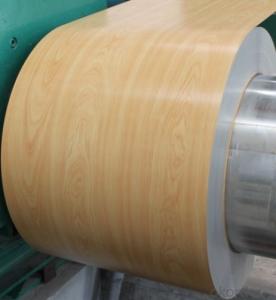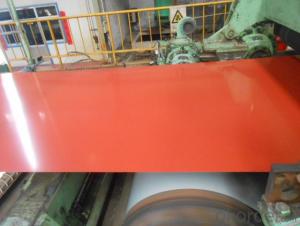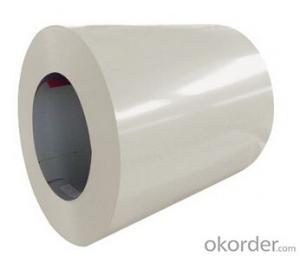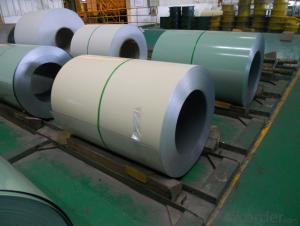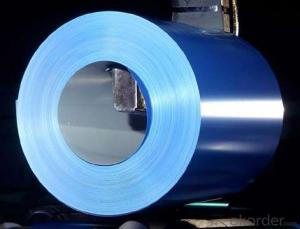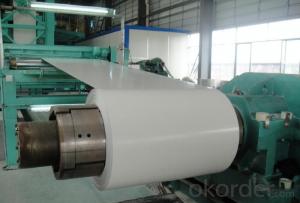Steel Coil /color coated hot rolled steel coil/PPGI Coil
- Loading Port:
- Shanghai
- Payment Terms:
- TT OR LC
- Min Order Qty:
- 30 m.t.
- Supply Capability:
- 10000 m.t./month
OKorder Service Pledge
OKorder Financial Service
You Might Also Like
Quick Details
| Standard: | ASTM,GB,JIS | Grade: | STEEL | Thickness: | 0.18MM-0.8MM |
| Place of Origin: | Zhejiang China (Mainland) | Brand Name: | sukalp | Model Number: | 820 |
| Type: | Steel Coil | Technique: | Cold Rolled | Surface Treatment: | Coated |
| Application: | HOUSE AND BUILDING | Special Use: | High-strength Steel Plate | Width: | 500MM-1600MM |
| Length: | as your request | Zinc coating: | 40-275g/m2 | Coil ID: | 508mm/610mm |
Packaging & Delivery
| Packaging Detail: | export package |
| Delivery Detail: | 15 days after receipt the deposit |
Specifications
Pre-Painted Steel Coil
1)Thinkness of pre-painted steel coil 0.18MM-0.8MM
2)Width of pre-painted steel coil 500MM-1600MM
Pre-Painted Steel coil Features Specifications:
Galvanized steel is hot or cold-rolled strip steel belt of substrates, through continuous hot-dip galvanizin process.It is good in corrosion resistance,high in surface quality, convenient in deep-processing,low cost. Widely used in silo,the fish up , the chimney, kitchen utensil, handicraft, construction formwork, household electrical appliance, roller shutter door, garage door, wave wattand colored substrate,etc.
Product details:
Product | Hot dip galvanized corrugated steel coil/sheet |
material | SGCC,SGCH,SGCE,SPCG,DX51D,Q195,Q235 |
Thickness | 0.13-0.6mm |
Width | 914-1500mm(according to your need) |
Zinc coating | 40-275g/m2 |
Spangle | Regular, small, big or zero |
Coil Weight | 3-8tons |
Capacity | 250,000 tons/year |
Coil ID | 508mm/610mm |
- Q: How do steel coils compare to other materials in terms of strength?
- Steel coils are known for their exceptional strength and durability, making them one of the strongest materials available in the market. Compared to other materials, such as aluminum or plastic, steel coils exhibit superior strength and resistance to deformation or breakage. The high tensile strength of steel allows coils to withstand heavy loads, making them ideal for various industrial applications, including construction, automotive manufacturing, and the production of heavy machinery. Additionally, steel coils possess excellent fatigue resistance, meaning they can endure repeated stress and strain without losing their structural integrity. This strength advantage makes steel coils a preferred choice for applications where reliability and safety are of utmost importance.
- Q: How are steel coils used in the manufacturing of agricultural sprayers?
- Steel coils are used in the manufacturing of agricultural sprayers to create the frames and structures that provide stability and durability to the sprayer. The coils are shaped and welded to form the main body and support components, ensuring the sprayer can withstand the rigors of field use and maintain its functionality for extended periods.
- Q: What is the typical size and weight of a steel coil?
- The specific application and industry play a role in determining the varying size and weight of a steel coil. Generally, steel coils are manufactured with widths that range from 0.5 to 2 meters (1.6 to 6.6 feet) and can weigh anywhere between 1 to 25 metric tons (2,205 to 55,116 pounds). The size and weight of a steel coil are influenced by factors such as the type of steel utilized, the intended purpose of the coil, and the manufacturing method employed.
- Q: How are steel coils inspected for thickness and width accuracy?
- Steel coils are inspected for thickness and width accuracy using various methods. One common method is using non-contact laser or ultrasonic sensors that scan the surface of the coil to measure its thickness and width. These sensors provide accurate measurements without physically touching the coil. Additionally, manual measurements can be taken using calipers or micrometers to verify the accuracy of the coil's dimensions. Overall, a combination of non-contact sensors and manual measurements ensure that steel coils meet the required thickness and width specifications.
- Q: How long do steel coils last?
- The durability of steel coils can differ based on different elements, including the steel's quality, the storage or usage conditions, and the specific application. Typically, top-notch steel coils can endure for numerous years or even decades before exhibiting any signs of deterioration or wear. Nevertheless, it is essential to acknowledge that if steel coils are not adequately maintained or shielded from moisture or harsh surroundings, they can be prone to corrosion. Consequently, consistent inspection, maintenance, and appropriate storage or usage methods play a pivotal role in optimizing the lifespan of steel coils.
- Q: Steel or stainless steel
- Steel often has impurities that can generate fumes, which cause a fever identical to smoke inhalation. You always need to be concerned about what you are breathing around hot metal.
- Q: Can steel coils be coated with magnetically attractive materials?
- Yes, steel coils can be coated with magnetically attractive materials.
- Q: What are the common coil thickness tolerances?
- The common coil thickness tolerances can vary depending on the specific industry and application. However, typical tolerances for coil thickness range from +/- 0.001 inches to +/- 0.005 inches.
- Q: How do steel coil manufacturers handle custom orders?
- Custom orders for steel coils are handled by manufacturers through a methodical process. They begin by comprehending the specific requirements of the customer and engaging in detailed communication to gather information. This includes dimensions, tolerances, and other special needs. Manufacturers may offer technical expertise to ensure the feasibility of the custom order. Once the requirements are clarified, manufacturers proceed with designing and engineering the custom steel coils. Advanced software and engineering tools are utilized to create detailed designs and specifications that cater to the customer's unique needs. Prototypes or samples may be created for the customer's approval before full-scale production. After the design phase, manufacturers initiate the production process by sourcing the appropriate raw materials, such as steel coils with the desired composition and thickness. The coils undergo various manufacturing stages, including cutting, shaping, and forming, to achieve the desired dimensions and shapes. Specialized equipment and machinery guarantee precision and accuracy throughout the production process. Quality control plays a crucial role in handling custom orders. Manufacturers conduct thorough inspections and testing procedures at different stages of production to ensure that the custom coils meet the customer's specifications and industry standards. This involves checking for dimensional accuracy, surface finish, mechanical properties, and other specific requirements. Third-party inspection agencies may be involved, and manufacturers may provide customers with test reports and certifications to ensure quality assurance. Lastly, once the custom steel coils are manufactured and pass all quality checks, they are meticulously packaged and delivered to the customer. Manufacturers ensure proper packaging and shipping methods to prevent damage during transit and ensure the coils reach the customer in optimal condition. In summary, steel coil manufacturers handle custom orders by collaborating closely with customers, designing and engineering specialized coils, maintaining quality control throughout the production process, and delivering the custom coils to the customer's satisfaction. This systematic approach enables manufacturers to meet the unique requirements of each customer and provide high-quality custom steel coils.
- Q: How are steel coils inspected for yield strength?
- Steel coils are inspected for yield strength through a series of testing methods. The most common and widely used method is the tensile test. In this test, a small sample is taken from the steel coil and subjected to a controlled load until it reaches its yield point. During the tensile test, the sample is gradually stretched until it deforms and ultimately breaks. The load and elongation data are continuously recorded during this process. The yield strength is then determined by identifying the point on the stress-strain curve where the material begins to exhibit plastic deformation or permanent elongation. Another method used to inspect steel coils for yield strength is the hardness test. Hardness is often correlated with yield strength, and therefore, a hardness test can provide an estimation of the material's yield strength. This test involves measuring the resistance of the steel coil's surface to indentation or penetration using instruments like a Rockwell or Brinell hardness tester. Additionally, non-destructive testing methods such as ultrasonic testing and magnetic particle inspection can also be employed to evaluate yield strength. Ultrasonic testing involves the use of high-frequency sound waves to detect any internal defects or inconsistencies in the material's structure. Magnetic particle inspection, on the other hand, relies on the application of magnetic fields and the use of magnetic particles to identify surface cracks or defects. Overall, various testing methods are available to inspect steel coils for yield strength. These methods provide manufacturers and inspectors with valuable information about the quality and performance capabilities of the steel, ensuring that it meets the required standards and specifications.
Send your message to us
Steel Coil /color coated hot rolled steel coil/PPGI Coil
- Loading Port:
- Shanghai
- Payment Terms:
- TT OR LC
- Min Order Qty:
- 30 m.t.
- Supply Capability:
- 10000 m.t./month
OKorder Service Pledge
OKorder Financial Service
Similar products
Hot products
Hot Searches
Related keywords
